In this Article:
Try Kanbanchi now
Start your free trial
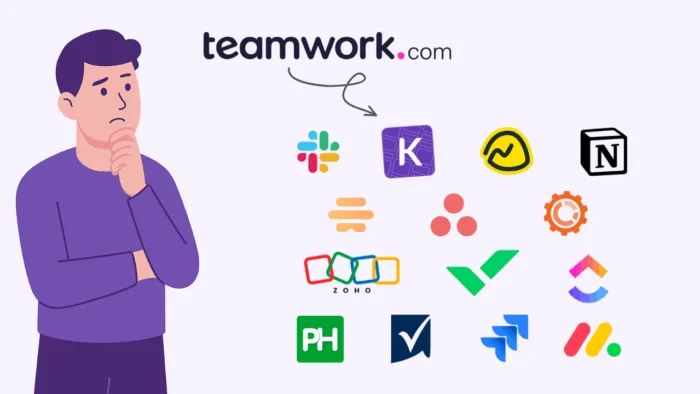
Almost all businesses need some form of dedicated task or project management software to run effectively in 2025.
Teamwork is one of the most popular tools for remote or hybrid teams, bringing flexibility, efficiency, and productivity to project management—but it’s not without its limitations and weaknesses.
So, what are the best Teamwork alternatives? First, let’s consider what Teamwork’s main strengths are:
However, Teamwork’s main weaknesses include:
In this article, we explore why businesses may be seeking alternatives to Teamwork and how to go about choosing a different option. We then review the 15 best Teamwork projects alternatives available in the marketplace.
Let’s get straight into it!
Unless Teamwork.com is making project management much easier for your business or collaboration between team members more seamless and productive, it might be time to consider some Teamwork alternatives. There are plenty out there.
The main reasons why project managers, IT teams, and other leaders within forward-looking businesses are seeking alternatives to Teamwork in 2025 are summarized below…
Teamwork is comprehensive but some of the features may be unnecessarily complex for basic project management needs—or “overkill”. Small teams, consultants, and freelancers may prefer the more straightforward tools provided by one of the Teamwork project manager competitors, which offer functionality without the steep learning curve.
The Teamwork free plan provides up to five projects, five users, and 100 automations per month. Beyond this (and for more advanced features), you’ll need the paid plans, which start at $10.99/user/month billed annually ($13.99/user/month billed monthly). There are cheaper and even free Teamwork alternatives out there.
Complex permissions system
Teamwork’s permissions are highly customizable and secure but lack clear visual cues and inheritance logic. This can lead to access issues, confusion or even unintentional data exposure if not carefully managed—another reason why some businesses may seek alternatives to Teamwork.
Teamwork depends largely on users being online. Teams requiring offline access might find that one of the Teamwork alternatives is more suitable.
Teamwork has some reporting and analytics features but they are not as developed as some of the Teamwork alternatives, especially for measuring project performance and team productivity.
Some users report an inconsistent support experience from Teamwork, with slow response times. Waiting for a support ticket to get resolved can be frustrating for teams working to project deadlines, prompting some teams to seek alternatives to Teamwork.
There’s no point in jumping out of the frying pan into the fire with project management tools. If you’re considering Teamwork.com alternatives, you want to make sure that the tool you’re switching to does what you need.
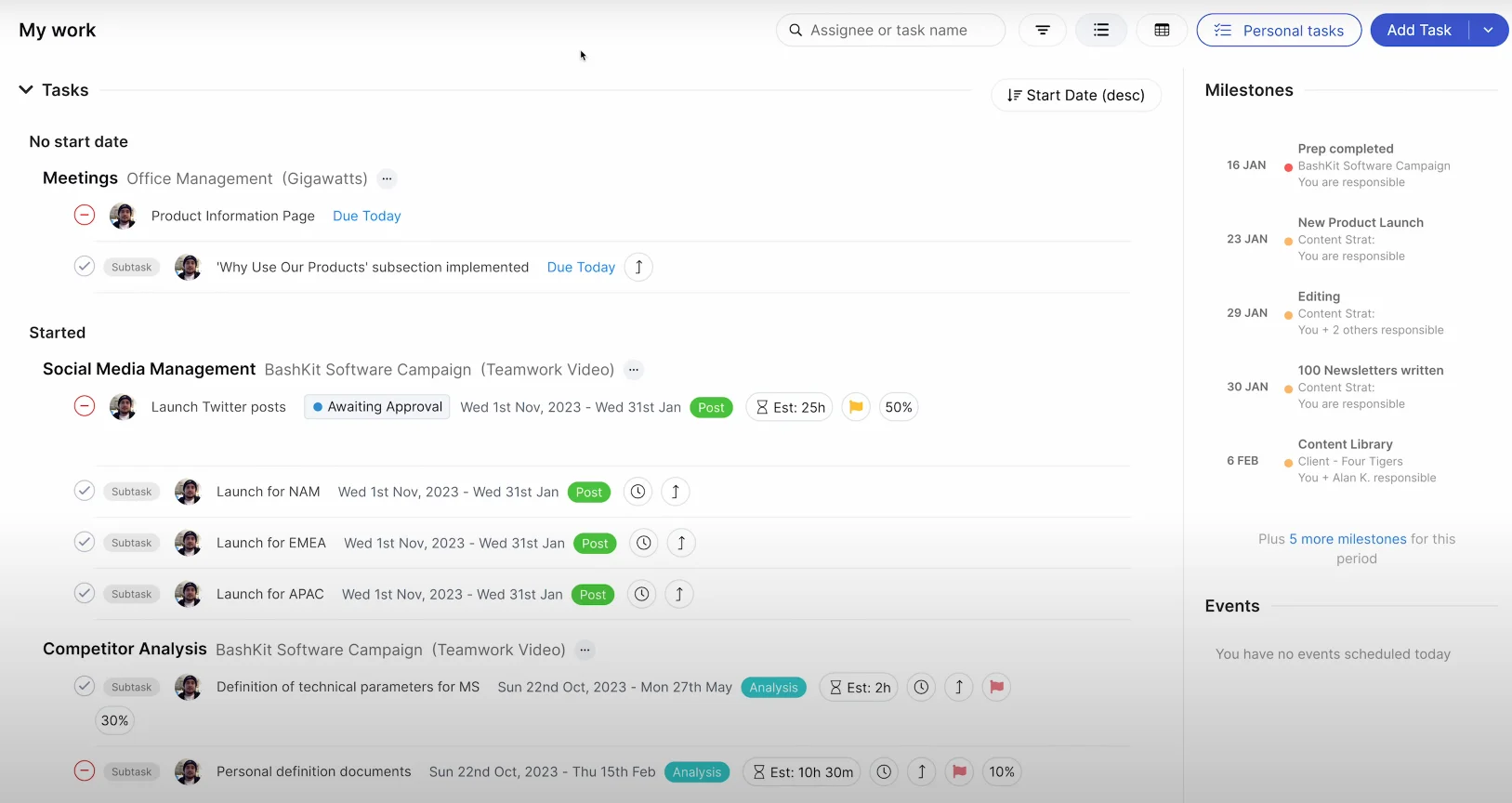
When selecting a Teamwork alternative, assess usability, features, customizability, and integrations to meet your team’s needs
Depending on your precise requirements, you’ll probably need to assess the following when selecting a Teamwork projects alternative:
The usability of the project management tool will impact how readily it is adopted by team members. This includes the ease of setup, user interface, ease of navigation, and more. User feedback and reviews often reveal much about the pros and cons of the software.
A basic consideration for any Teamwork alternative is the strength of its features—for instance, its task management, time tracking, and collaboration features (email, task comments, file sharing, etc.), as well as any advanced features for project planning and resource management.
The ability to customize workflows, templates, and dashboards according to team preferences might be a key requirement of any Teamwork projects alternatives for businesses.
Can the software support your needs as you grow? The ability to scale up to higher plans for more users and/or more advanced project management features is needed by many startups and growing organizations.
Any alternatives to Teamwork you consider should integrate with the existing software in your business. You’ll need to consider how easily it connects with other tools like the CRM, email, cloud storage, and calendar system, for instance. Does it do this natively or do you need third-party apps to enable it?
The starting price and other paid plans (with more advanced features or more users/projects) are important considerations when assessing Teamwork alternatives. Can freelancers, consultants, and small businesses afford it or is it designed for larger businesses and enterprises?
If you have an issue with your project management software, are you left to fend for yourself, can you chat to a live agent, do you have access to email or a community forum or is there a library of FAQs, tutorials, and other resources on the website to help?
Our team has already spent hours assessing the criteria outlined above to save you some work. The following table summarizes what we’ve found about the top 15 Teamwork project manager alternatives. Below the table, we go into more detail about each tool…
| Tool | Best For | User Rating* | Key Benefits | Starting Price (Monthly) |
|---|---|---|---|---|
| Kanbanchi |
|
4.7 | Designed for Google-centric teams Easy to use with intuitive interface Advanced PM tools, including time-tracking Advanced reporting Secure SSO (Google) Support with a human |
$5.99/user/month |
| Trello |
|
4.4 | User-friendly & highly visual. Strong integration ecosystem. Extensive user community for support Mobile-friendly for remote workers |
$6/user/month |
| ClickUp |
|
4.7 | Central task, document & time management Automation, integration & customization options Flexible with multiple work views Scalable |
$10/user/month |
| Wrike |
|
4.2 | Powerful tools for cross-functional teams Enterprise-grade security & permissions Highly customizable Advanced automation |
$10/user/month |
| Zoho Projects |
|
4.3 | Extensive syncing with other Zoho tools Affordable & feature-rich. Highly customizable Extensive user community for support issues. |
$5/user/month |
| Smartsheet | Midsize & large organizations familiar with Excel/Sheets-based work environments | 4.4 | Familiar spreadsheet interface Powerful automation & workflows Excellent for cross-departmental coordination Enterprise-ready with advanced security & compliance |
$12/user/month |
| Notion |
|
4.7 | Unified workspace Customization options offer flexibility Collaboration tools & AI/automation options to enhance efficiency Added security & compliance (paid plans & enterprise) |
$12/user/month |
| Monday |
|
4.7 | Extensive template library & native integration ecosystem Automation to simplify workflows Unified documentation Robust dashboards & analytics |
$12/user/month |
| Jira |
|
4.3 | Highly configurable for custom issue types, etc. Excellent reporting with real-time insights Scalable & secure Massive integration ecosystem |
$8.60/user/month |
| ProofHub |
|
4.6 | Flat-fee pricing (no per-user fees) Intuitive UI for fast onboarding All-in-one collaboration tools Basic reporting & analytics provided |
$50/month flat fee (up to 45 projects) |
| Basecamp |
|
4.1 | Suitable for internal & client-facing projects Economical at scale (flat-rate pricing) Intuitive & simple setup Reliable real-time & asynchronous communication |
Flat rate $349/year paid monthly Or $15/user/month |
| ProWorkflow |
|
4.1 | Comprehensive & intuitive suite of tools Integrated time & billing features Secure & stable iOS/Android support |
$20/user/month |
| Hive |
|
4.6 | A single unified workspace Affordable & modular pricing Real-time insights from analytics & dashboards Highly configurable communication & collaborative features |
$5/user/month |
| Asana |
|
4.4 | User-friendly, all-in-one PM software Many native integrations Robust automation to simplify workflows Enterprise-ready with SSO, compliance, etc. |
$13.49/user/month |
| Slack |
|
4.5 | Fast, intuitive communication Vast integration network Communication archive with strong search features Built-in automations |
$8.75 user/month |
*User ratings are based on reviews from the G2 software review website.
Kanbanchi is a Kanban-based project management tool designed specifically for users embedded in the Google Workspace ecosystem.
Its simple user interface and deep Google integration help those using Gmail, Drive, Calendar, and Forms manage workflows and collaborate on projects more productively than having to use multiple third-party add-ons.
Coordinating remote work and managing agile projects becomes easy and efficient, with visual tracking of work progress in multiple work views.
Kanbanchi’s boards are stored as files on Google Drive, making it convenient and secure. No additional passwords are required beyond the existing Google access setup.
Another distinguishing factor of Kanbanchi is its support with a real human—a feature very much appreciated by users, according to the excellent reviews the tool receives, making it a leading Teamwork project manager alternative in this list.
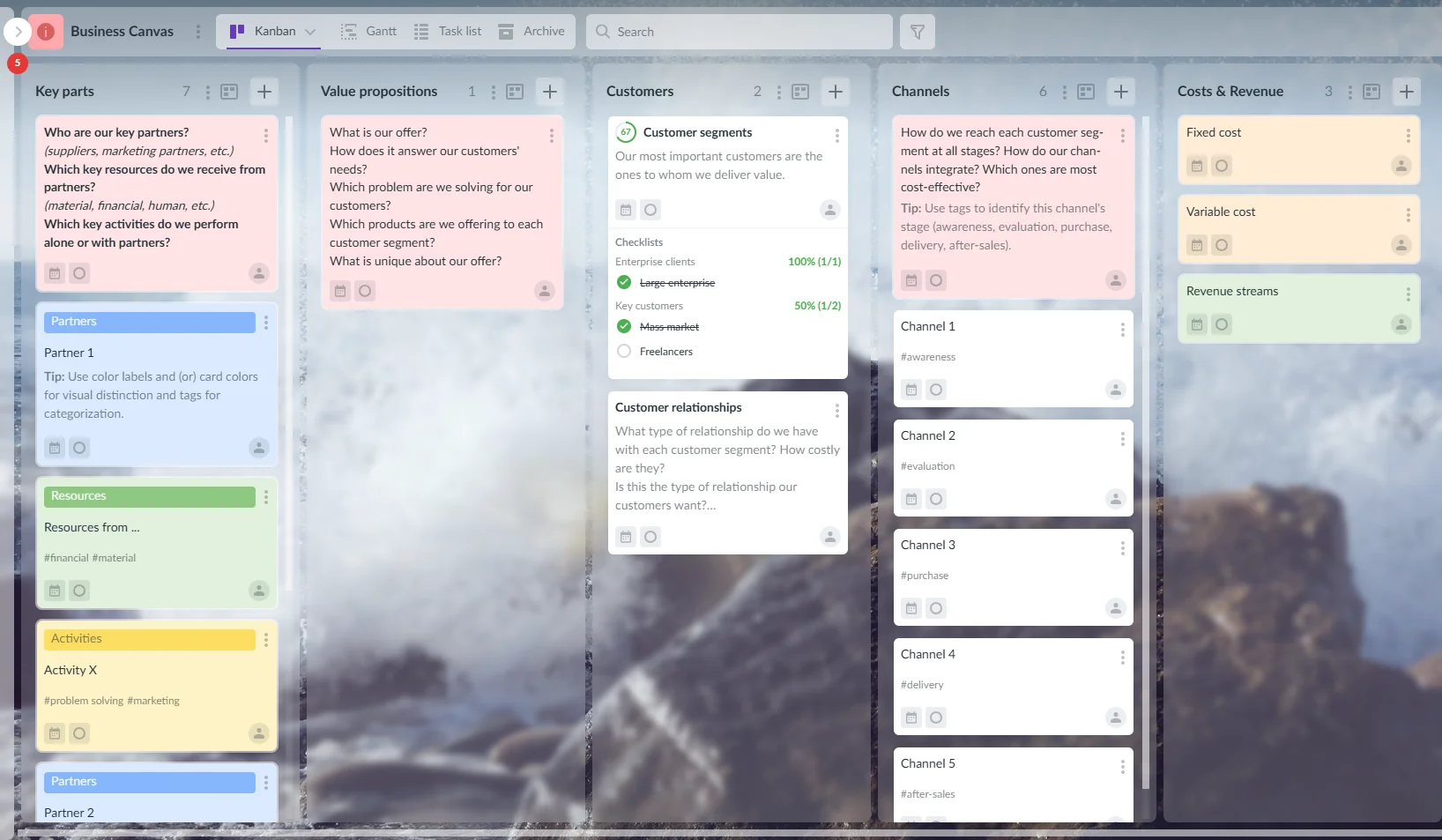
Kanbanchi is a Kanban-based tool with deep Google Workspace integration for seamless project management
Best for: Small to mid-size teams (5-50 users) but also good for larger businesses and enterprises.
Major organizations that use Kanbanchi include:
Free plan:
Paid plans:
BOOK A FREE TRIAL OF KANBANCHI
Trello is part of the Atlassian suite of software solutions for project management. It is one of the most popular alternatives to Teamwork and is used by many freelancers, professionals, and small and mid-sized teams.
Trello offers a simple user interface, Kanban board views, a comprehensive range of integrations through Power-Ups (third-party tools), a fully functional mobile app, automation tools, and a generous free plan that makes it attractive to the budget-conscious.
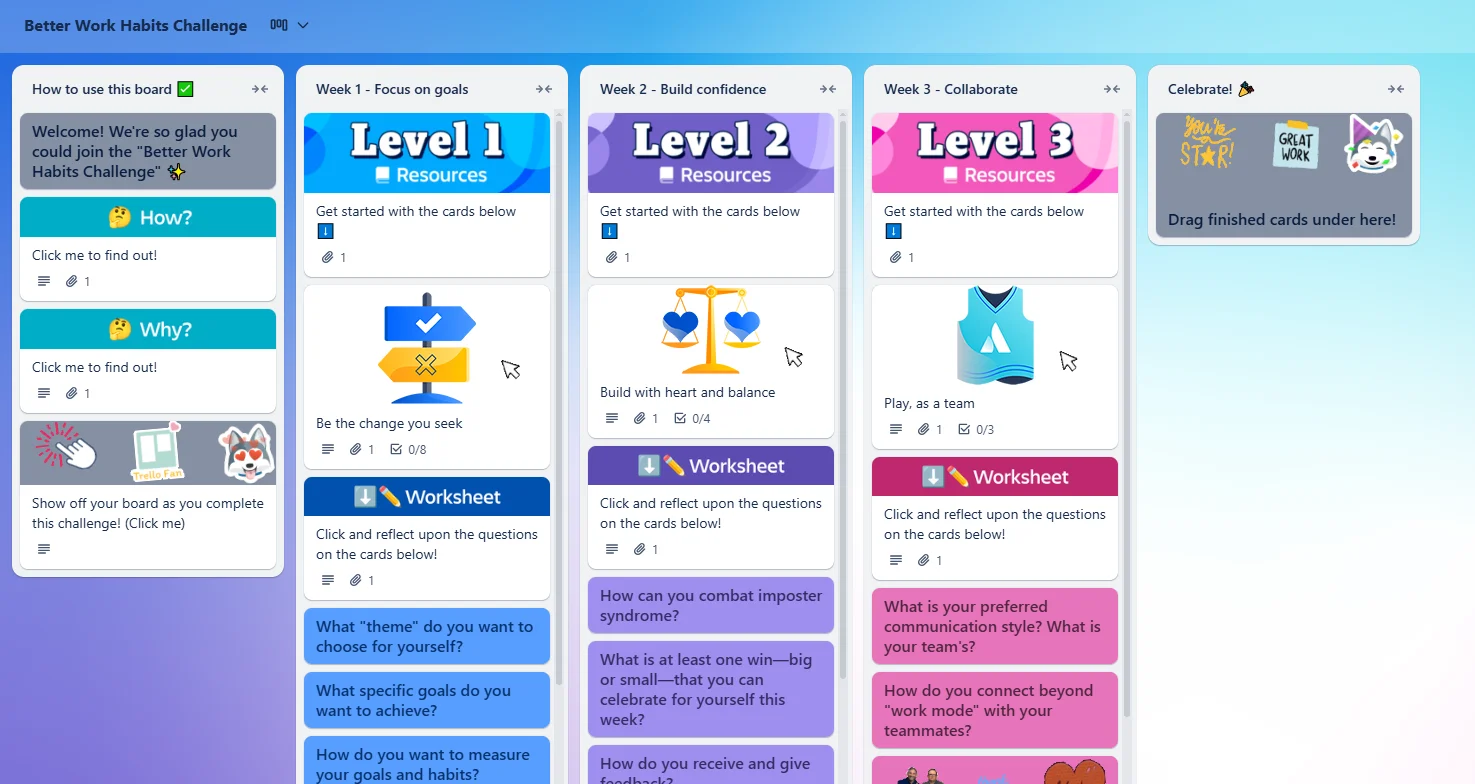
Trello’s simple and visual Kanban interface makes it an easy tool for managing projects and tasks.
…and many more via Power-Ups
Best for: Consultants, freelancers, and solopreneurs, as well as small to mid-size teams.
Major organizations that use Trello include:
Free plan:
Basic features for up to 10 collaborators per workspace.
Paid plans:
ClickUp is another of the best Teamwork project management alternatives, offering a comprehensive, all-in-one platform to act as a centralized hub for project collaboration.
This is an advanced solution that not only provides multiple work view options, such as Kanban boards, Gantt Charts, calendar views, and mind maps, but also customized workflows, built-in docs, whiteboards, time tracking, and automation.
ClickUp’s advanced features may be attractive for midsize to larger businesses and enterprises looking for an all-in-one Teamwork alternative but the steep learning curve can be “overkill” for smaller teams.
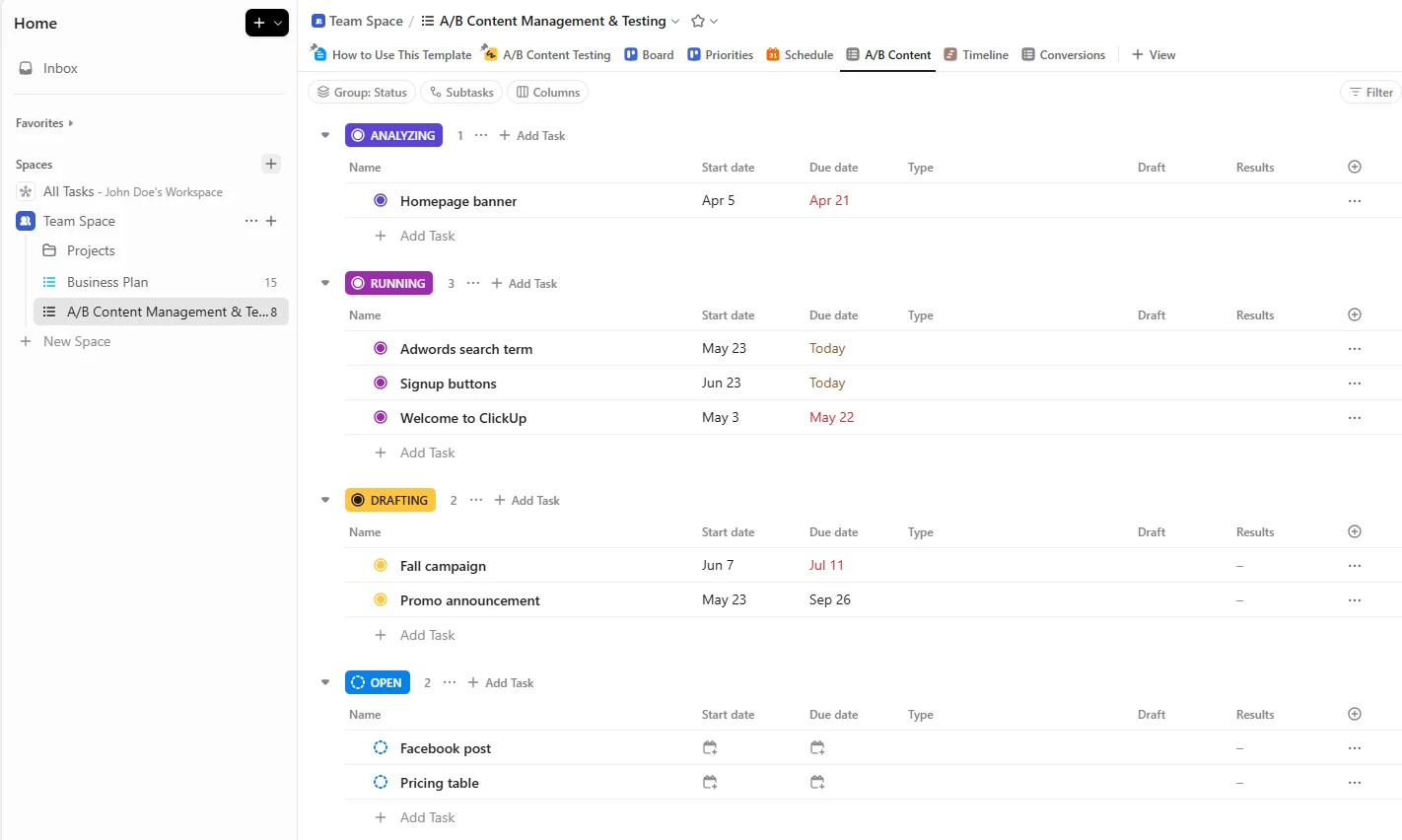
ClickUp offers an all-in-one platform with task management, time tracking, Gantt charts, and more for teams
Best for: Medium to large teams and enterprises (can support thousands of users).
Major organizations that use ClickUp include:
Free plan:
Paid plans:
Wrike is a highly secure and scalable alternative to Teamwork, mainly attractive for mid-sized or larger organizations with complex and comprehensive project management demands.
The advanced setup, security, permissions, and tools available with Wrike may be unnecessary for smaller organizations or solo users. Extensive reporting and collaboration tools, custom workflows and dashboards, multiple work views, time tracking, capacity planning, and resource management tools are, however, ideal for many enterprises.
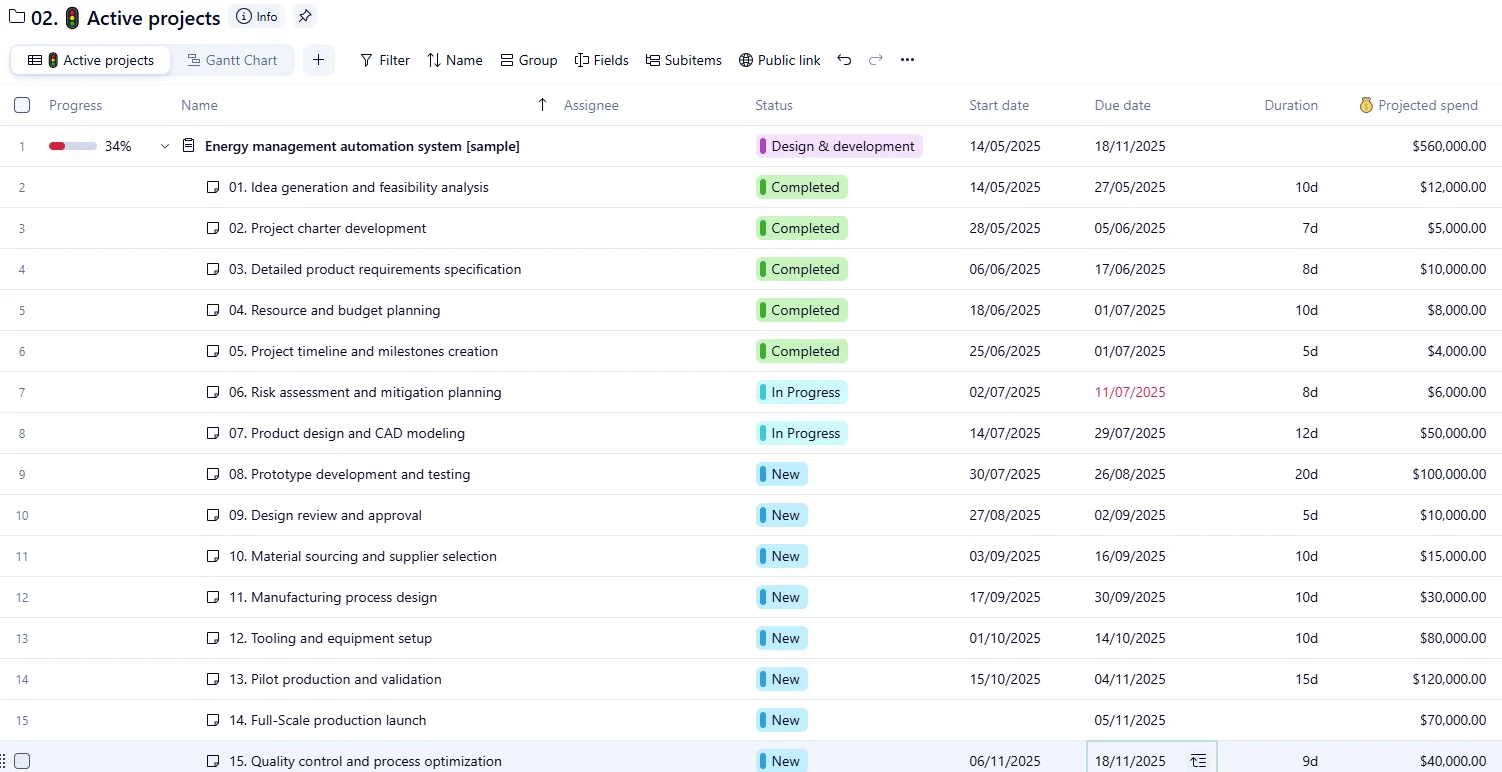
Wrike provides customizable workflows, reporting, and analytics for enterprise-level project management
Best for: Mid-sized teams, growing teams, enterprises.
Major organizations that use Wrike include:
Free plan:
Basic features but limited to 200 active tasks, including subtasks.
Paid plans:
For businesses already using the Zoho ecosystem of cloud business management tools, Zoho Projects is likely one of the best alternatives to Teamwork.
The Zoho suite is celebrated for its ability to manage everything from customers to employees and business processes. Zoho Projects is an effective project management solution that integrates seamlessly with the 45+ other tools in the Zoho ecosystem, offering several workflow views and extensive collaboration from a central platform.
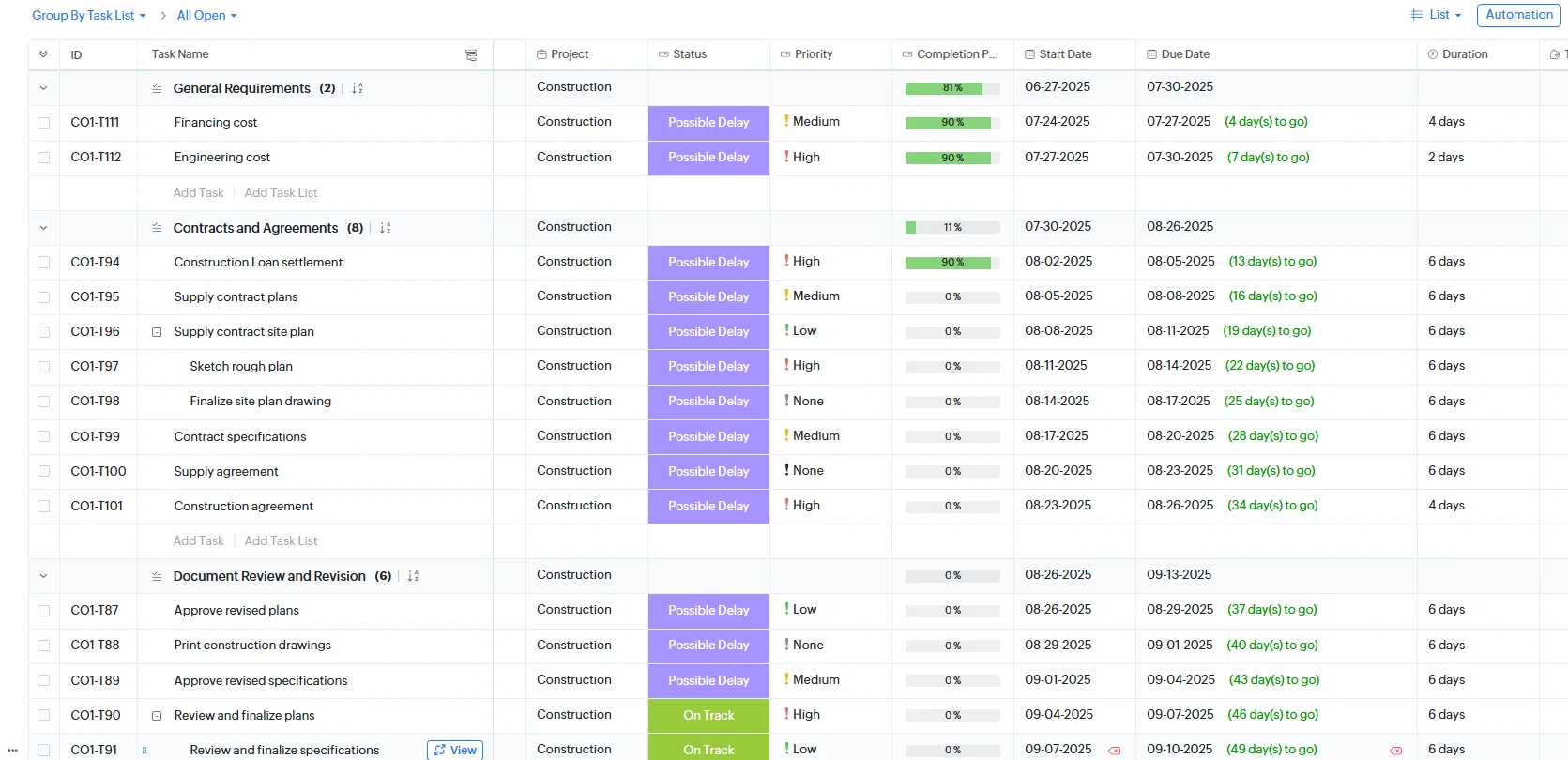
Zoho Projects integrates well with other Zoho tools, making it ideal for businesses using the Zoho ecosystem
Best for: Scales well for startups and organizations, small and large, already using other Zoho apps.
Major organizations that use Zoho Projects include:
Free plan:
Paid plans:
For midsize and large organizations that prefer a spreadsheet-based working environment, Smartsheet might be one of the best Teamwork alternatives to consider for project management.
Smartsheet offers a spreadsheet-style interface with multiple work views (Gantt charts, Kanban boards, and Calendar views), a large template library, and extensive integrations. It is secure, scalable, and customizable for businesses that need to manage, automate, and report on tasks within work projects.
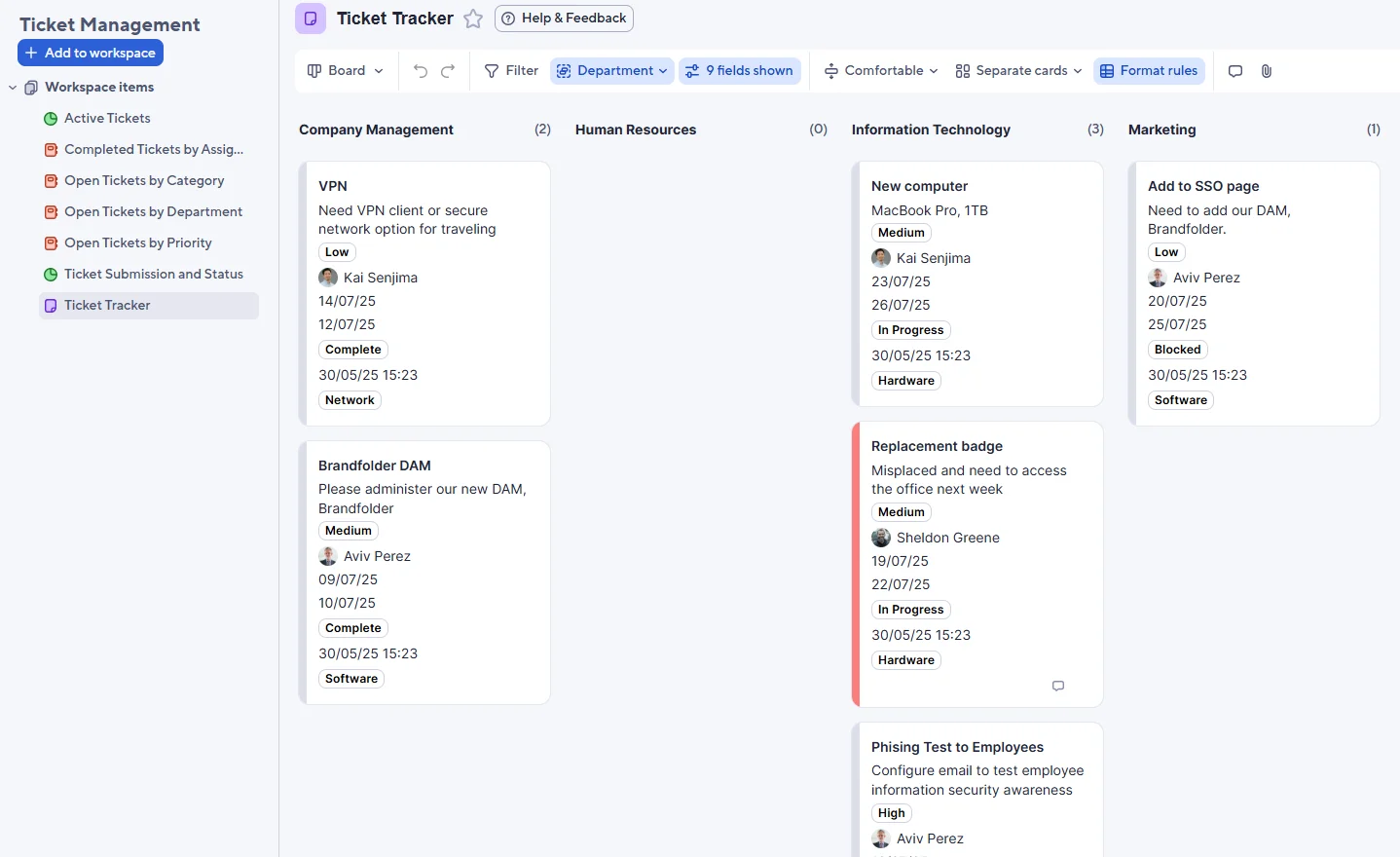
Smartsheet’s spreadsheet-style interface provides robust project tracking and reporting for teams of all sizes
Best for: Teams in mid-size to large organizations and enterprises.
Major organizations that use Smartsheet include:
Free plan:
Paid plans:
Notion is another all-in-one workspace that is worth considering as a Teamwork projects alternative for small businesses and startups.
Notion started life as a note-taking program but has evolved into more of a project management solution for teams looking for a customizable, automated environment in which to collaborate on projects.
Notion allows you to build task databases, boards, lists, calendars, and tables, with multiple work view options, collaboration tools, and templates.
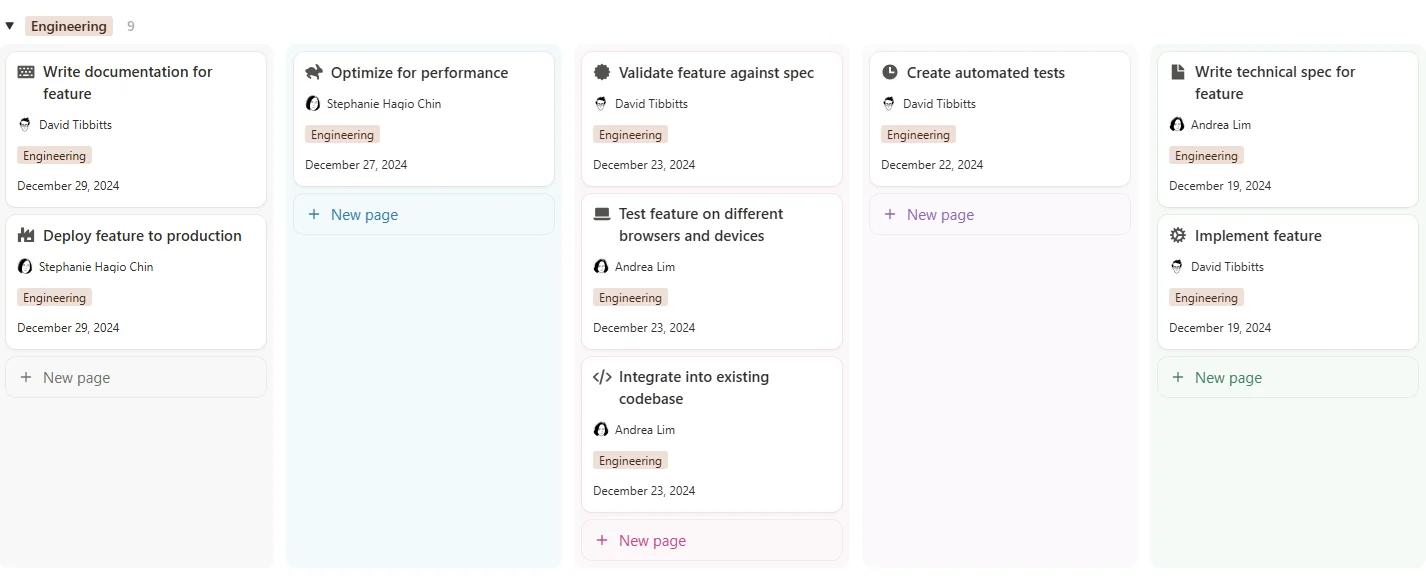
Notion combines task management with document collaboration for a flexible, customizable workspace
Best for: Individuals (free plan) but paid plans are better for growing teams and larger businesses.
Major organizations that use Notion for project management include:
Free plan:
Paid plans:
Monday is a viable Teamwork project management alternative geared towards everyone from individuals and small and medium businesses up to enterprises.
Commonly used as task management software (setting deadlines, assigning tasks, and tracking tasks), Monday can also be customized and configured for greater functionality and more complex project management with the right technical know-how.
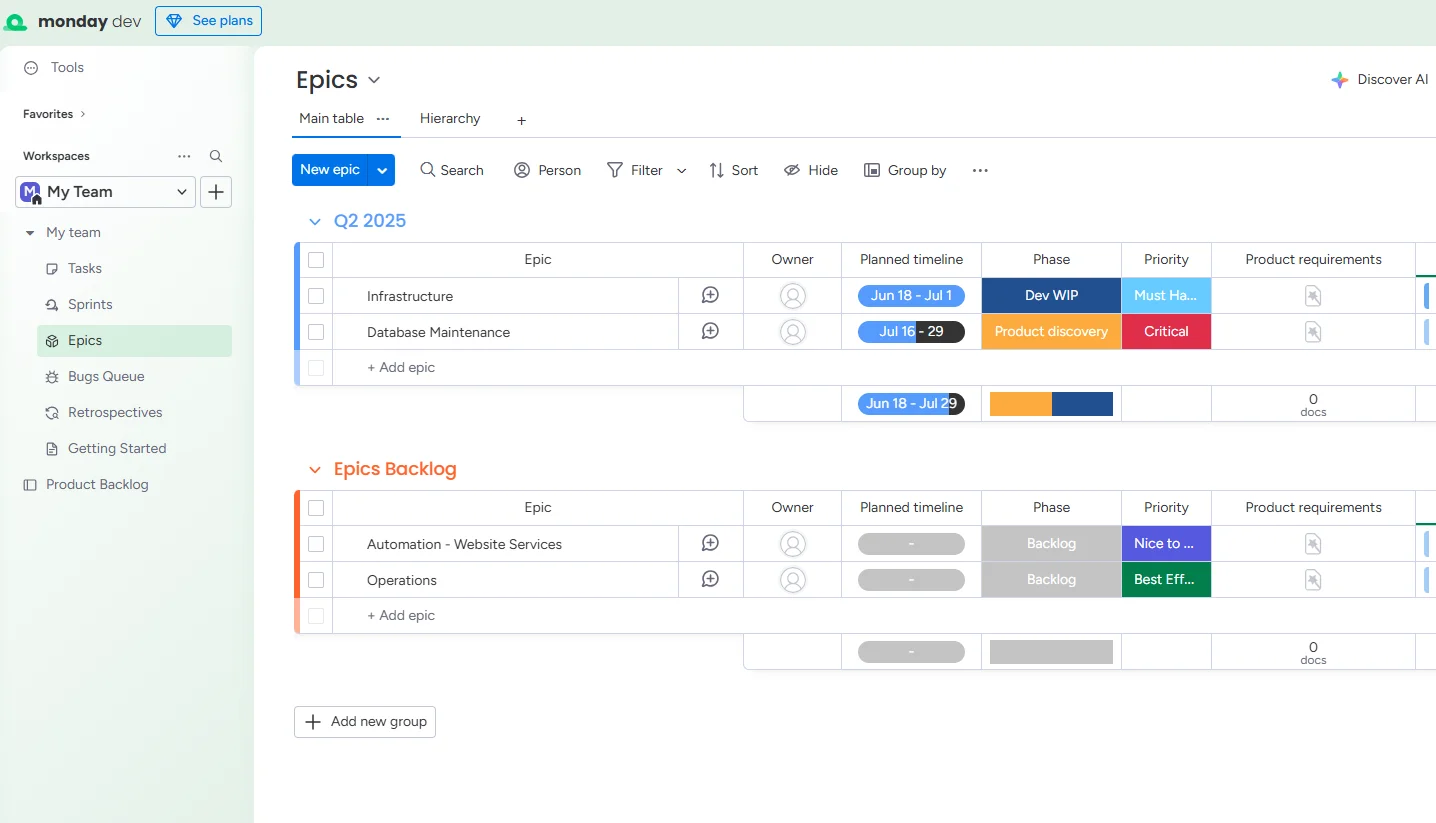
Monday offers customizable project views, time tracking, and collaboration tools for teams
Best for: Small to mid-size teams but is also enterprise-ready (can support thousands of users).
Major organizations that use Monday include:
Free plan:
Paid plans:
Like Trello, Jira is part of the Atlassian suite of products. Originally built to track issues in software development, Jira has developed into a project management tool for a range of issues and work items.
Jira offers multiple work views and good customization options but unless you are in the tech, software design or ops sector, and need to track issues—or already use Atlassian tools extensively—you may prefer other alternatives to Teamwork outlined here.
Jira is a powerful tool for Agile teams, with customizable workflows, issue tracking, and project management
Best for: Freelancers & small teams, SMBs & mid-sized teams, enterprises (tech sector and issue-tracking).
Major organizations that use Jira include:
Free plan:
Paid plans:
ProofHub is a user-friendly, all-in-one project collaboration platform that can rival Teamwork if you’re considering your options.
ProofHub’s flat rate pricing model (with unlimited users) makes it especially cost-effective for larger teams. Another strength is its built-in proofing and team discussions, though businesses requiring more integrations and reporting flexibility may lean towards other Teamwork alternatives.
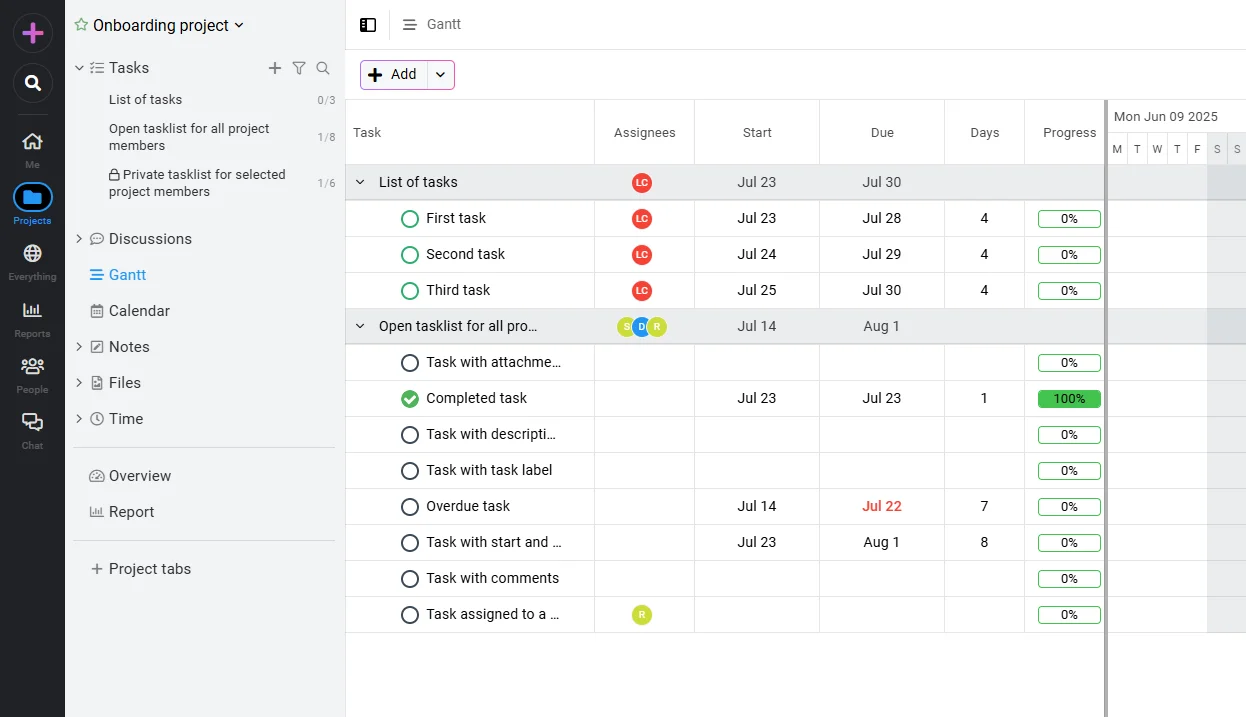
ProofHub allows teams to manage tasks, time tracking, and file proofing in one intuitive platform
Best for: Scales well for teams of 20 to 50+ people (though lack of integrations may be restrictive).
Organizations that use ProofHub include:
Free plan:
Paid plans:
Released in 2004, Basecamp was one of the first web-based project collaboration platforms—and it’s still going strong today.
As a relatively simple tool for straightforward project/task management, team communication, and client collaboration, Basecamp works well as an alternative to Teamwork.
With flat pricing and a well-developed feature set, Basecamp scales well but it is less suitable for teams with more complex project management or advanced reporting requirements.
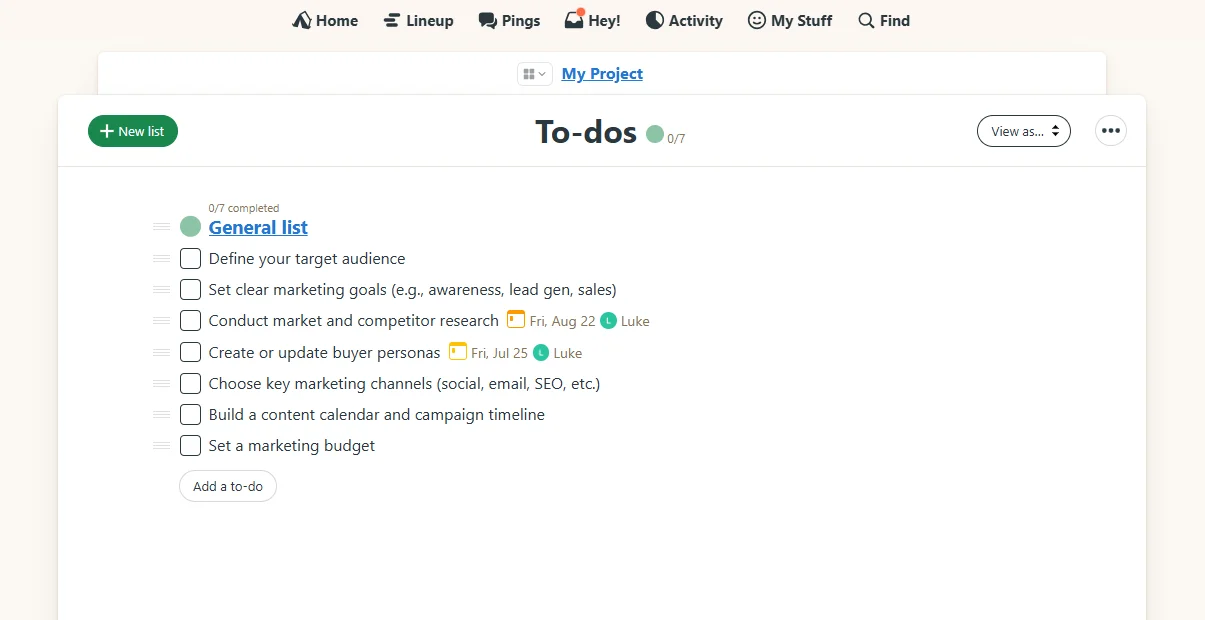
Basecamp offers a simple, flat-rate platform for task management, team communication, and client collaboration
Best for: Small to mid-sized teams—from solo users to hundreds of users across projects.
Major organizations that use Basecamp include:
Free plan:
Paid plans:
ProWorkflow is another of the Teamwork.com alternatives to consider if you need advanced project management features that integrate with accounting/billing software—and you are prepared to pay a little more for these features.
This robust project management solution includes native time billing and resource planning, making it especially suitable for professional services and small-to-mid-sized teams. However, users might need some technical know-how for configuring third-party integrations.
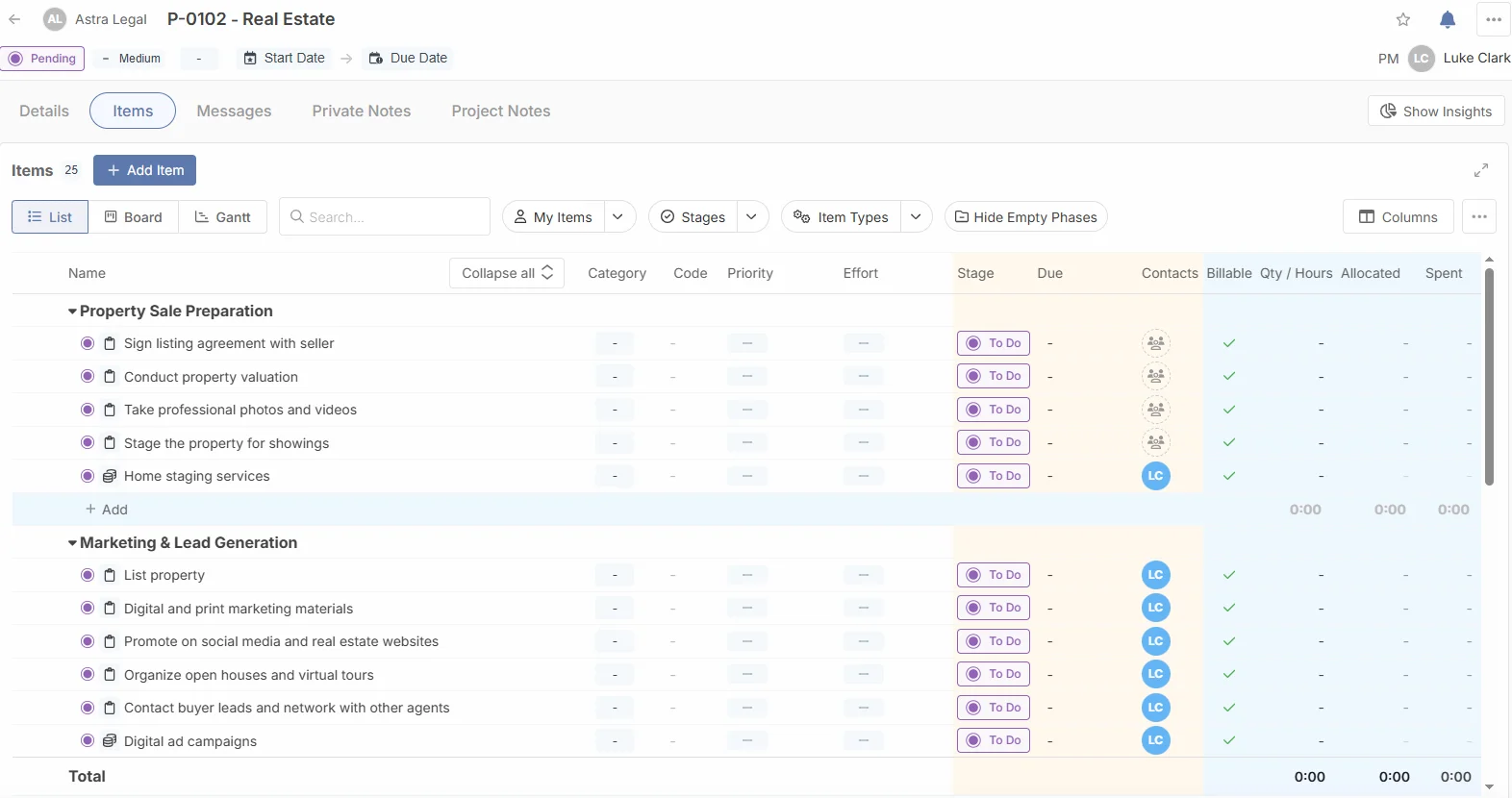
ProWorkflow integrates project management with billing and time tracking, ideal for professional services
Best for: Consultants, professional services teams, mid-sized teams, and enterprises.
Organizations that use ProWorkflow include:
Free plan:
Paid plans:
Hive is a good Teamwork.com alternative for creative and cross-functional teams needing a feature-rich, collaborative platform for productive project management.
With an intuitive interface, integrated inbox management, proofing workflows, flexible views, and AI support, Hive provides rich features for teams managing multiple complex projects. For individuals and professional consultants, one of the other Teamwork competitors may be more suitable.
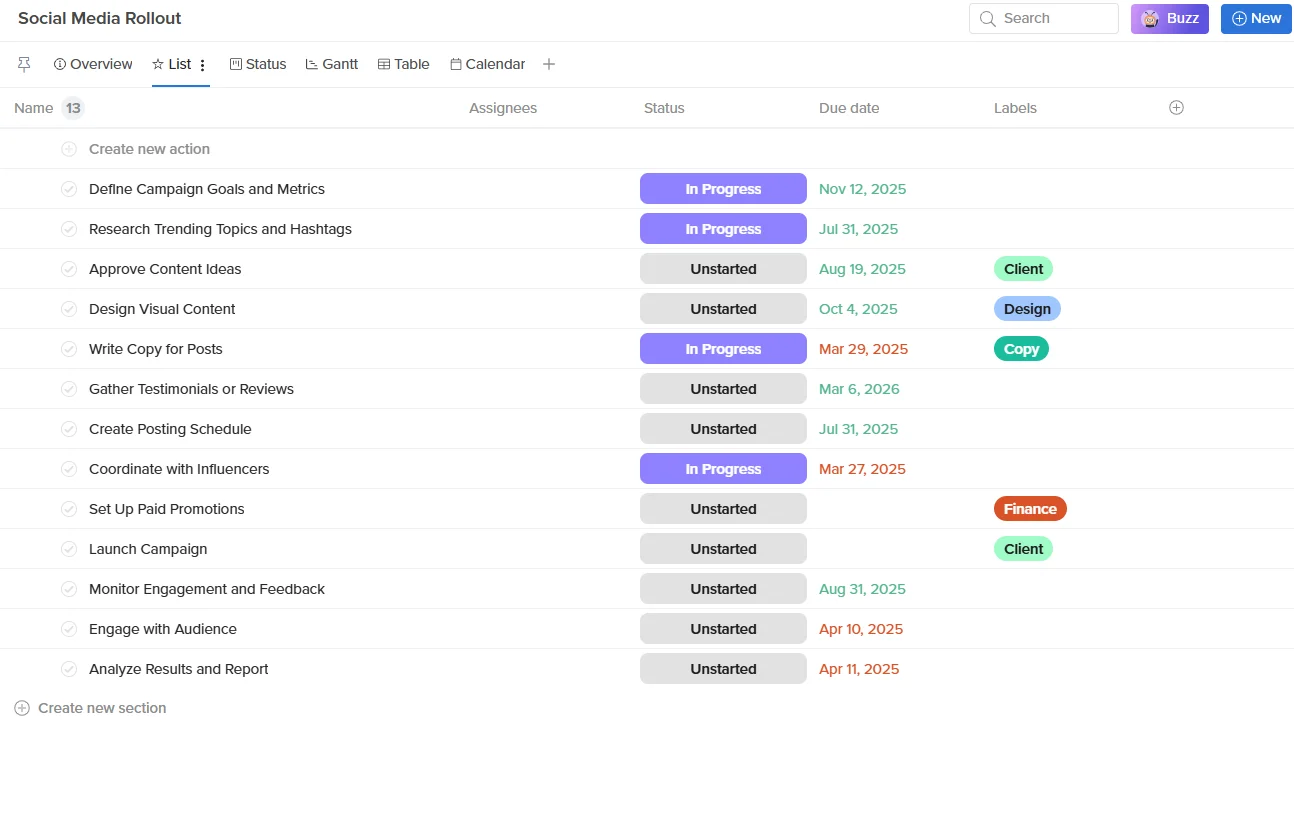
Hive offers an integrated project management platform with proofing, task tracking, and automation
Best for: Small to midsize businesses (SMBs) and agencies (especially cross-functional teams).
Major organizations that use Hive include:
Free plan:
Paid plans:
Asana is a popular task and project management solution, and one of the more formidable Teamwork projects competitors available.
A user-friendly design and strong collection of task management and collaboration tools make Asana accessible to most team members without training. It is a versatile solution that combines file storage, project roadmaps, dashboards, and more in one attractive interface.
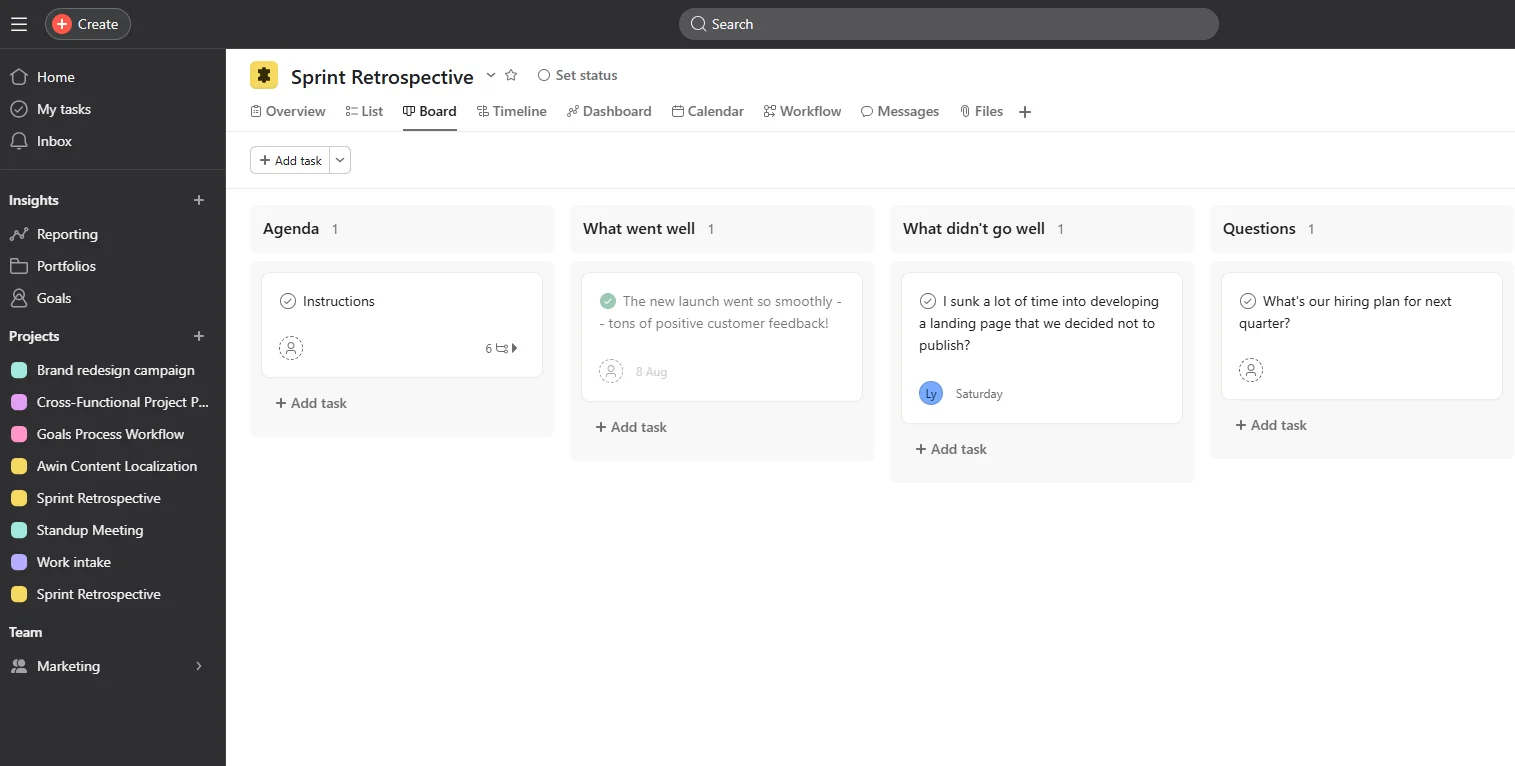
Asana provides a comprehensive platform for task management with project roadmaps, dashboards, and collaboration.
Best for: Mid-sized to large teams and enterprises.
Major organizations that use Asana include:
Free plan:
Paid plans:
Slack may not be the first name that comes to mind when considering Teamwork projects alternatives because it is best known as a team communication and collaboration platform—in fact, it’s often credited with revolutionizing how remote teams communicate.
However, Slack’s simplicity, real-time messaging in streamlined channels, and file sharing capabilities complement many project management tools when integrated effectively, so we include it on this comparison list.
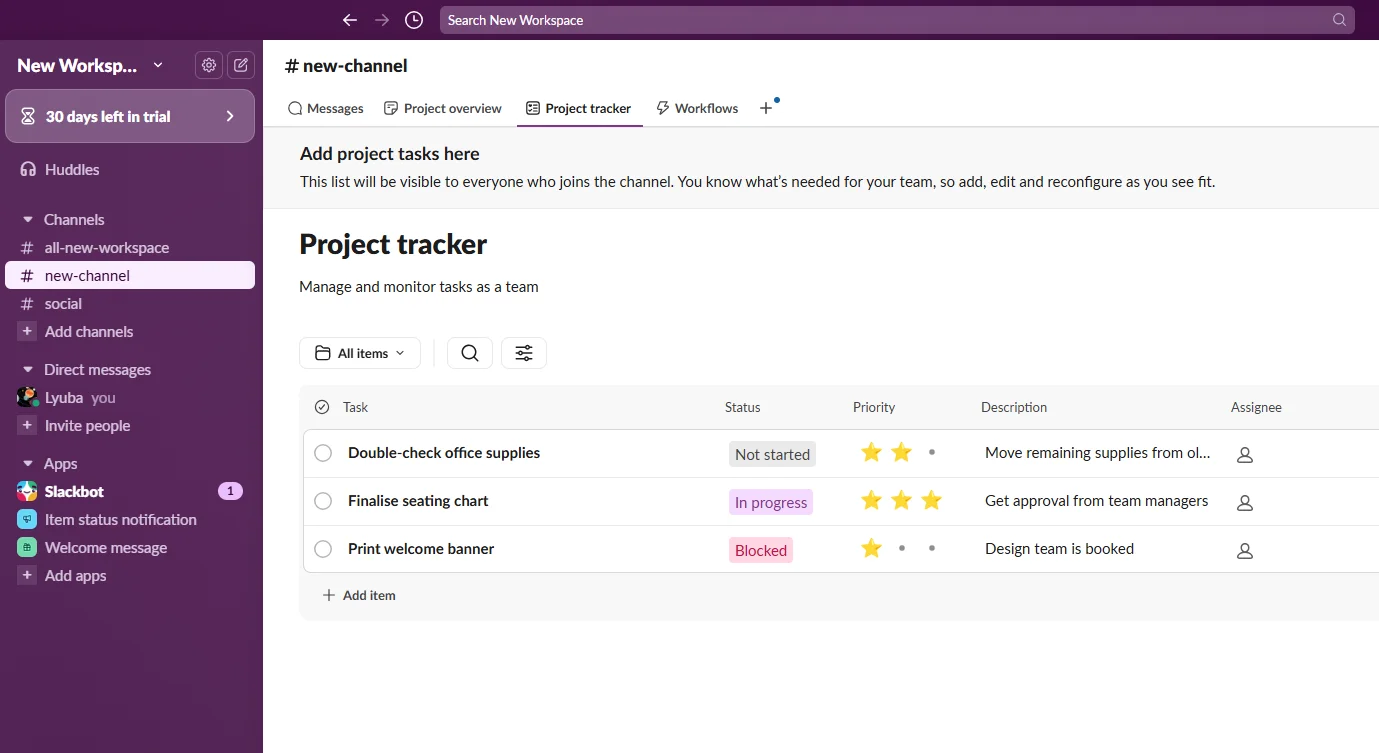
Slack’s real-time messaging and integrations complement project management tools for enhanced collaboration
Best for: All teams from small businesses and startup teams to global enterprises.
Major organizations that use Slack include:
Free plan:
Paid plans:
When choosing project management software from one of Teamwork’s competitors, you need to be sure that you’re solving the main deficiencies of Teamwork—and not creating more problems for your business.
Getting the choice right can turn inefficient workflows into successful project outcomes, without any need to increase your budget (it may reduce your monthly fees).
Kanbanchi’s rating on G2 is the highest of any of the Teamwork project alternatives outlined. For Google Workspace users, in particular, the native integrations with Drive, Gmail, and Calendar are a game-changer with Kanbanchi.
Beyond this, Kanbanchi’s impressive range of features and benefits makes up for some of the shortcomings of Teamwork. You can expect the following from Kanbanchi:
As your business grows, Kanbanchi offers additional functionality and customizations to cope with more complex projects, scaling with your organization.
BOOK A FREE TRIAL OF KANBANCHI
You should consider user experience, feature set, customizability, scalability, integrations, pricing/value, customer support, and any other unique requirements of your business before deciding on a teamwork alternative.
Teamwork is quite reasonably priced (starting at $13.99/user/month billed monthly) but there are more cost-effective alternatives out there, including Kanbanchi, with monthly pricing starting at $5.99/user.
Seamless integration between your project management software and your other business applications is essential—or it can slow down collaboration, communications, and other business processes. For Google environments, for instance, the native integrations offered by Kanbanchi are a major benefit over other Teamwork projects alternatives.
Sometimes. For newcomers to project management, some tools require training to get to grips with more advanced PM tools. Other tools like Kanbanchi, Trello, and other Kanban-style solutions are generally very easy to pick up with very little learning curve.
In this Article:
Start using Kanbanchi now
Start your free trial